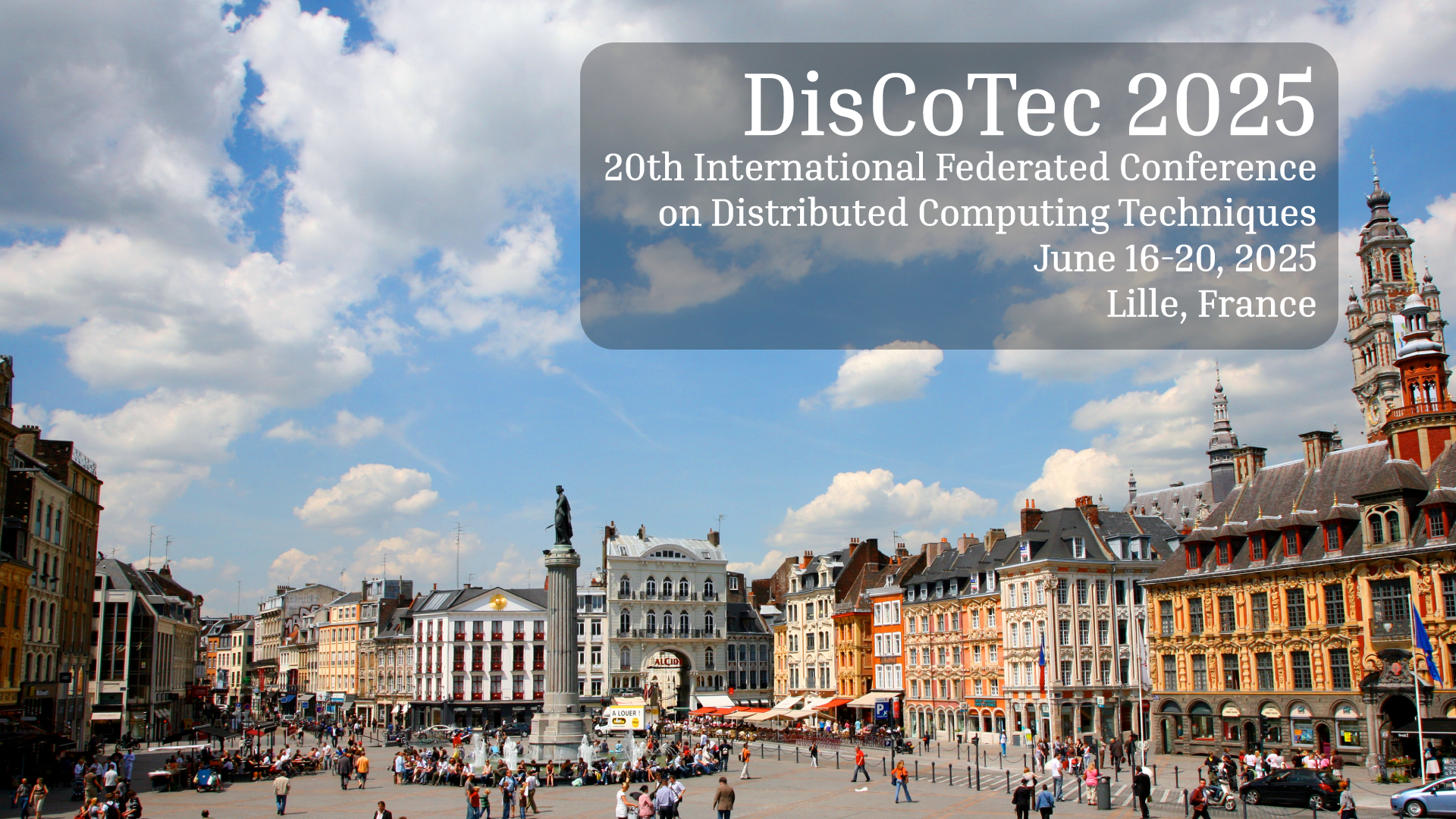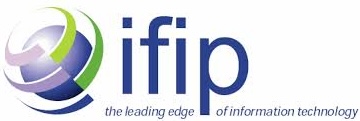ICE 2025 - 18th Interaction and Concurrency Experience
Interaction and Concurrency Experiences (ICE) is a series of international scientific meetings oriented to theoretical computer science researchers with special interest in models, verification, tools, and programming primitives for concurrent systems and complex interactions.
ICE 2025 is a satellite workshop of DisCoTec 2025, held on June 20th in Lille, France.
Highlights
- Distinctive selection procedure
- ICE welcomes full papers to be included in the proceedings
- ICE also welcomes oral communications of already published or preliminary work
- Invited speaker: Kirstin Peters – On the Expressiveness of MPST
- Publication in EPTCS
- Special issue in the Journal of Logical and Algebraic Methods in Programming (Elsevier) (to be confirmed)
- Contact:
ice (at) framalistes.org
Important Dates
- April 9th, 2025 : Paper submission deadline
- April 10th – May 2nd : Forum interaction, reviews, and PC discussion
- May 5th : Notification to authors
- June 20th : Workshop in Lille, France
- July 20th (tentative) : Camera-ready for post-proceedings
- October 2025 (tentative) : Invitation to special issue
All dates are in the Anywhere on Earth time zone.
Scope
The general scope of the venue includes theoretical and applied aspects of interactions and the synchronization mechanisms used among components of concurrent/distributed systems, related to several areas of computer science in the broad spectrum ranging from formal specification and analysis to studies inspired by emerging computational models.
We solicit contributions relevant to Interaction and Concurrency, including but not limited to:
- Formal semantics
- Process algebras and calculi
- Models and languages
- Protocols
- Logics and types
- Expressiveness
- Model transformations
- Tools, implementations, and experiments
- Specification and verification
- Coinductive techniques
- Tools and techniques for automation
- Synthesis techniques
Accepted Papers
The proceedings have been published as volume 425 of EPTCS.
Links below are to informal pre-proceedings.
- Modular Multiparty Sessions with Mixed Choice by Franco Barbanera, Mariangiola Dezani
- Identity Crisis in Attested TLS for Confidential Computing (Oral communication) by Muhammad Usama Sardar
- Reactive Semantics for User Interface Description Languages by Basile Pesin, Celia Picard, Cyril Allignol
- Bisimilarity and Simulatability of Processes Parameterized by Join Interactions by Clemens Grabmayer and Maurizio Murgia
- A Formalization of the Reversible Concurrent Calculus CCSKP in Beluga by Gabriele Cecilia
Programme
All times are listed for CEST (Central European Summer Time)
| Time CEST | |
|---|---|
| 9:00-9:15 | Opening |
| 9:15-10:15 | Kirstin Peters – On the Expressiveness of MPST (Invited talk) |
| 10:30-11:00 | Coffee break |
| 11:00-11:30 | Modular Multiparty Sessions with Mixed Choice (presented by F. Barbanera) |
| 11:30-11:40 | Fire drill |
| 11:40-11:55 | Modular Multiparty Sessions with Mixed Choice (contd) |
| 11:55-12:40 | Reactive Semantics for User Interface Description Languages (presented by B. Pesin) |
| 12:40-14:00 | Lunch |
| 14:00-14:45 | Bisimilarity and Simulatability of Processes Parameterized by Join Interactions (presented by M. Murgia) |
| 14:45-15:30 | A Formalization of the Reversible Concurrent Calculus CCSKP in Beluga (presented by G. Cecilia) |
| 15:30-16:00 | Coffee break |
| 16:00-16:45 | Identity Crisis in Attested TLS for Confidential Computing (Oral communication) (presented by M. U. Sardar) |
| 16:45-17:15 | Panel meeting |
| 19:30-?? | Event dinner at L’Estaminet du Welsh. OpenStreetMap, Google Maps |
Links are to slides.
The ICE Selection Procedure
Since its first edition in 2008, the distinguishing feature of ICE has been an innovative paper selection mechanism based on an interactive, friendly, and constructive discussion amongst authors and PC members in an online forum.
During the review phase, each submission is published in a dedicated discussion forum. The discussion forum can be accessed by the authors of the submission and by all PC members not in conflict with the submission (the forum preserves anonymity). The forum is used by reviewers to ask questions, clarifications, and modifications from the authors, allowing them better to explain and to improve all aspects of their submission. The evaluation of the submission will take into account not only the reviews, but also the outcome of the discussion.
As witnessed by the past editions of ICE, this procedure considerably improves the accuracy of the reviews, the fairness of the selection, the quality of camera-ready papers, and the discussion during the workshop.
ICE adopts a light double-anonymous reviewing process, detailed below.
Submission Guidelines
Submissions must be made electronically in PDF format via hotcrp.
We invite two types of submissions:
-
Research papers, original contributions that will be published in the workshop post-proceedings. Research papers must not be simultaneously submitted to other conferences/workshops with refereed proceedings. Research papers should be 3-16 pages plus at most 2 pages of references. Short research papers are welcome; for example a 5 page short paper fits this category perfectly. The submitted PDF can use any LaTeX style (but the post-proceedings will use the EPTCS style).
-
Oral communications will be presented at the workshop, but will not appear in the post-proceedings. This type of contribution includes e.g., previously published contributions, preliminary work, and position papers. There is no strict page limit for this kind of submission but papers of 1-5 pages would be appreciated. For example, a one page summary of previously published work is welcome in this category.
Authors of research papers must omit their names and institutions from the title page, they should refer to their other work in the third person and omit acknowledgements that could reveal their identity or affiliation. The purpose is to avoid any bias based on authors’ identity characteristics, such as gender, seniority, or nationality, in the review process. Our goal is to facilitate an unbiased approach to reviewing by supporting reviewers’ access to works that do not carry obvious references to the authors’ identities. As mentioned above, this is a lightweight double-anonymous process. Anonymization should not be a heavy burden for authors, and should not make papers weaker or more difficult to review. Advertising the paper on alternate forums (e.g., on a personal web-page, pre-print archive, email, talks, discussions with colleagues) is permitted.
Papers in the “Oral communications” category need not be anonymized. For any questions concerning the double anonymous process, feel free to contact the ICEcreamers.
We are keen to enhance the balanced, inclusive and diverse nature of the ICE community, and would particularly encourage female colleagues and members of other underrepresented groups to submit their work.
Publications
Accepted research papers and communications must be presented at the workshop by one of the authors.
Accepted research papers will be published after the workshop in Electronic Proceedings in Theoretical Computer Science.
We plan to invite authors of selected papers and brief announcements to submit their work in a special issue in the Journal of Logical and Algebraic Methods in Programming (Elsevier) (to be confirmed). Such contributions will be regularly peer-reviewed according to the standard journal policy, but they will be handled in a shorter time than regular submissions. A list of published and in preparation special issues of previous ICE editions is reported below.
Invited Speaker: Kirstin Peters
Talk: On the Expressiveness of MPST
Multiparty session types (MPST) are a type discipline for enforcing the structured, deadlock-free communication of concurrent and message-passing programs. In this talk we will analyse the expressive power of MPST. In particular, we are interested in features that mark the difference expressive power of synchronous and asynchronous distributed languages. In the synchronous pi-calculus mixed choice is the main ingredient for its expressive power. Traditional MPST have in contrast usually a limited form of choice, in which alternative communication possibilities are offered by a single participant and selected by another. Accordingly, we extend MPST by a more general mixed choice construct.
Biography
Kirstin Peters studied computer science at the university of Potsdam, did her PhD at the technical university of Berlin. After some stops at Uppsala University and the technical university of Dresden, she had a junior professorship at the technical university of Darmstadt. Since April 2022, she is a professor at the university of Augsburg.
ICEcreamers
- Clément Aubert (Augusta University, 🇺🇸) -
aubert (at) math.cnrs.fr - Cinzia Di Giusto (Université Côte d’Azur, CNRS, I3SSophia Antipolis, 🇫🇷) -
cinzia.di-giusto (at) unice.fr - Simon Fowler (University of Glasgow School of Computing Science, 🇬🇧) -
simon.fowler (at) glasgow.ac.uk - Violet Ka I Pun (Western Norway University of Applied Sciences, 🇳🇴) -
Violet.Ka.I.Pun (at) hvl.no
Use ice (at) framalistes.org to reach all the ICEcreamers at once.
Programme Committee
- Franco Barbanera (Dept. of Mathematics and Computer Science - University of Catania, 🇮🇹 )
- Manel Barkallah (University of Namur, 🇧🇪)
- Matteo Cimini (University of Massachusetts Lowell, 🇺🇸)
- Farzaneh Derakhshan (Illinois Tech, 🇺🇸)
- Emanuele D’Osualdo (University of Konstanz, 🇩🇪)
- Luc Edixhoven (University of Southern Denmark, 🇩🇰) ★
- Lorenzo Gheri (University of Liverpool, 🇬🇧)
- Lucie Guillou (IRIF, Université Paris Cité, 🇫🇷)
- Ping Hou (University of Oxford, 🇬🇧)
- Andrew K. Hirsch (University at Buffalo, SUNY, 🇺🇸)
- Jonas Kastberg Hinrichsen (IT University of Copenhagen, 🇩🇰)
- Matthew Alan Le Brun (University of Glasgow, 🇬🇧)
- Andreia Mordido (LASIGE, University of Lisbon, 🇵🇹)
- Maurizio Murgia (Gran Sasso Science Institute, 🇮🇹)
- Jonah Pears (University of Kent, 🇬🇧)
- Felix Stutz (University of Luxembourg, 🇱🇺)
- Petra van den Bos (Formal Methods and Tools group (FMT) (University of Twente, 🇳🇱)
- Bas van den Heuvel (HKA Karlsruhe and University of Freiburg, 🇩🇪)
★ The ICE 2025 Outstanding PC Member Award was awarded to Luc Edixhoven!
Steering Committee
- Massimo Bartoletti (University of Cagliari, 🇮🇹)
- Ludovic Henrio (ENS Lyon, 🇫🇷)
- Sophia Knight (University of Minnesota Duluth, 🇺🇸)
- Ivan Lanese (University of Bologna, 🇮🇹)
- Larisa Safina (INRIA Lille, 🇫🇷)
- Alceste Scalas (Technical University of Denmark, 🇩🇰)
Previous Editions
For a complete listing of our previous editions, please refer to ice-workshop.github.io/#previous-editions.
More Information
For additional information, please refer to the series website or contact the ICEcreamers at ice (at) framalistes.org.






